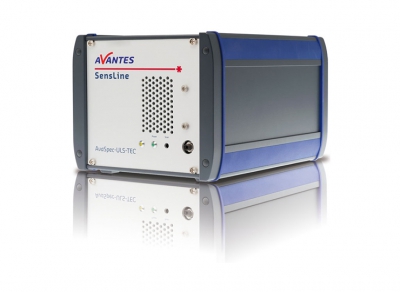AvaSpec-ULS2048x64TEC
技術データ・特徴他
| オプティカルベンチ | ULS Symmetrical Czerny-Turner, 75 mm focal length |
|---|---|
| 波長範囲 | 200-1160 nm |
| 解像度 | 0.09-20 nm, depending on configuration (see table) |
| 迷光 | < 1%, depending on the grating |
| 感度 | 300,000 counts/µW per ms integration time |
| ディテクター | CCD linear array, 2048×64 pixels, Low Noise |
| 温度冷気CCD | Max.ΔT = -35°C versus ambient. Optimal setting: 5°C |
| 3 stage Peltier cooling internal Power supply@ΔT=-35° | 5VDC, 3.0A |
| シグナル/ノイズ | 550:1 |
| ADコンバーター | 16 bit, 500 KHz |
| 積分時間 | 9.7 ms – 10 minutes |
| インターフェイス | USB 2.0 high speed, 480 Mbps |
| RS-232, 115.200 bps | |
| サンプル速度(with on-board averaging) | 9.7 ms /scan |
| データ転送速度 | 9.7 ms /scan (USB2) |
| 432 ms / scan (RS-232) | |
| デジタル IO | HD-26 connector, 2 Analog in, 2 Analog out, 3 Digital in, 12 Digital out, trigger, sync. |
| 電力供給 | 100-240VAC, 50W |
| サイズ、重量 | 250 x 179 x 144 mm, 3.6 kg |
グレーティング
| Use | Useable range | Spectral range (nm) | Lines/mm | Blaze (nm) | Order code |
|---|---|---|---|---|---|
| UV/VIS/NIR | 200-1160** | 960** | 300 | 300 | UA |
| UV/VIS/NIR | 200-1100** | 900** | 300 | 300/1000 | UNA-DB |
| UV/VIS | 200-850 | 520 | 600 | 300 | UB |
| UV | 200-750 | 250-220* | 1200 | 250 | UC |
| UV | 200-650 | 165-145* | 1800 | UV | UD |
| UV | 200-580 | 115-70* | 2400 | UV | UE |
| UV | 200-400 | 70-45* | 3600 | UV | UF |
| UV/VIS | 250-850 | 520 | 600 | 400 | BB |
| VIS/NIR | 300-1160** | 860** | 300 | 500 | VA |
| VIS | 360-1000 | 500 | 600 | 500 | VB |
| VIS | 300-800 | 250-200* | 1200 | 500 | VC |
| VIS | 350-750 | 145-90* | 1800 | 500 | VD |
| VIS | 350-640 | 75-50* | 2400 | VIS | VE |
| NIR | 500-1050 | 500 | 600 | 750 | NB |
| NIR | 500-1050 | 220-150* | 1200 | 750 | NC |
| NIR | 600-1160 | 350-300* | 830 | 800 | SI |
| NIR | 600-1160** | 560** | 300 | 1000 | IA |
| NIR | 600-1160 | 500 | 600 | 1000 | IB |
*depends on the starting wavelength of the grating; the higher the wavelength, the bigger the dispersion and the smaller the range to select.
**please note that not all 2048 pixels will be used for the useable range
解像度
| Slit size (µm) | ||||||
|---|---|---|---|---|---|---|
| Grating (lines/mm) | 10 | 25 | 50 | 100 | 200 | 500 |
| 300 | 1.4 | 1.5 | 2.5 | 4.8 | 9.2 | 21.3 |
| 600 | 0.70-0.80* | 0.75-0.85* | 1.2 | 2.4 | 4.6 | 10.8 |
| 830 | 0.42-0.48* | 0.50-0.58* | 0.93 | 1.7 | 3.4 | 8.5 |
| 1200 | 0.25-0.31* | 0.37-0.43* | 0.52-0.66* | 1.1 | 2.3 | 5.4 |
| 1800 | 0.17-0.21* | 0.26-0.32* | 0.34-0.42* | 0.8 | 1.6 | 3.6 |
| 2400 | 0.12-0.18* | 0.18-0.24* | 0.26-0.34* | 0.44-0.64* | 1.1 | 2.7 |
| 3600 | 0.09-0.12* | 0.11-0.15* | 0.19 | 0.4 | 0.8 | 1.8 |
* depends on the starting wavelength of the grating; the higher the wavelength, the bigger the dispersion and the smaller the range to select.

